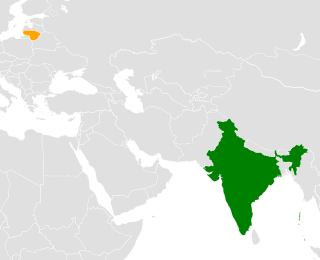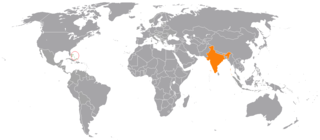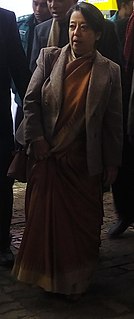Related Research Articles

Education in India is primarily managed by state-run public education system, which fall under the command of the government at three levels: Central, state and local. Under various articles of the Indian Constitution and the Right of Children to Free and Compulsory Education Act, 2009, free and compulsory education is provided as a fundamental right to children aged 6 to 14. The approximate ratio of public schools to private schools in India is 7:5. Major policy initiatives in Indian education are numerous. Up until 1976, education policies and implementation were determined legally by each of India’s constitutional states. The 42nd amendment to the constitution in 1976 made education a ‘concurrent subject’. From this point on the central and state governments shared formal responsibility for funding and administration of education. In a country as large as India, now with 28 states and eight union territories, this means that the potential for variations between states in the policies, plans, programs and initiatives for elementary education is vast. Periodically, national policy frameworks are created to guide states in their creation of state-level programs and policies. State governments and local government bodies manage the majority of primary and upper primary schools and the number of government-managed elementary schools is growing. Simultaneously the number and proportion managed by private bodies is growing. In 2005-6 83.13% of schools offering elementary education were managed by government and 16.86% of schools were under private management. Of those schools managed privately, one third are ‘aided’ and two thirds are ‘unaided’. Enrolment in Grades 1-8 is shared between government and privately managed schools in the ratio 73:27. However in rural areas this ratio is higher (80:20) and in urban areas much lower (36:66).

Arackaparambil Kurien Antony, better known as A. K. Antony is an Indian politician and attorney who was the 23rd Defence Minister of India. He is the current Member of Parliament in the Rajya Sabha, from Kerala for the fifth term since 1985. He also currently serves as the Chairman of the Disciplinary Action Committee of the All India Congress Committee, Congress Working Committee, and member of the Congress Core Group and Central Election Committee.

Sushma Swaraj was an Indian politician and a Supreme Court lawyer senior leader of Bharatiya Janata Party, Swaraj served as the Minister of External Affairs of India in the first Narendra Modi government (2014–2019). She was the second woman to hold the office, after Indira Gandhi. She was elected seven times as a Member of Parliament and three times as a Member of the Legislative Assembly. At the age of 25 in 1977, she became the youngest cabinet minister of Indian state of Haryana. She also served as 5th Chief Minister of Delhi for a short duration in 1998 and became the First female Chief Minister of Delhi.
The Secondary School Leaving Certificate is a certification obtained by a student on successful completion of an examination at the end of study at the secondary schooling level in India. The SSLC is obtained on passing the grade 10 public examination, which is commonly referred to as 'class 10 board examinations' in India. SSLC is a common eligibility examination popular in many states in India, especially Kerala, Karnataka, and Tamil Nadu.

The Ministry of External Affairs of India is the government agency responsible for maintaining the foreign relations of India. The Ministry of External Affairs is headed by the Minister of External Affairs, a Cabinet Minister. The Foreign Secretary, an Indian Foreign Service officer, is the most senior civil servant who is the head of the Department of Foreign Affairs. The Ministry represents the Government of India through embassies and is also responsible for India's representation at the United Nations and other international organizations. It also advises other Ministries and State Governments on foreign governments and institutions.
The Ministry of Minority Affairs is a ministry of the Government of India which was carved out of Ministry of Social Justice and Empowerment and created on 29 January 2006. It is the apex body for the central government's regulatory and developmental programmes for the minority religious communities in India, which include Muslims, Sikhs, Christians, Buddhists, Zoroastrians (Parsis) and Jains notified as minority communities in The Gazette of India under Section 2(c) of the National Commission for Minorities Act, 1992.
Central Secretariat Service is the administrative civil service under Group A and Group B of the Central Civil Services of the executive branch of the Government of India. They are governed by Central Secretariat Service Rules of 1962, which has been issued under the powers of Article 309 of the Constitution of India. The service members work under restrictions and rules of Central Civil Services (Conduct) Rules.
The Foreign Secretary of India is the top diplomat of India and administrative head of the Ministry of External Affairs. This post is held by an Indian Foreign Service officer of the rank of Secretary to Government of India. The current and 33rd Foreign Secretary of India is Harsh Vardhan Shringla who took charge on January 29, 2020. Shringla belongs to 1984 batch of IFS. He previously served as India's envoy to the United States, Bangladesh ,and Thailand.
The community of Indians in Kuwait includes Indian expatriates in Kuwait, as well as Kuwaiti citizens of Indian origin or descent. According to the Indian ministry of external affairs, there are around 989,000 Indians as of 2020. The majority of these originate from the south Indian states of Kerala and Tamil Nadu, with the former constituting for 66% of the population of Indian nationals.
Indians in Sweden are citizens and residents of Sweden who are of Indian descent.

India–Philippines relations, also knows as Indian-Filipino relations or Indo-Filipino relations, refers to the bilateral relations between the India and the Philippines. Diplomatic relations between India and the Philippines was established in 1949. India maintains an embassy in Manila, whilst the Philippines maintains one in New Delhi. A Treaty of Friendship was signed between the Philippines and India on 11 July 1952.

Brunei and India established diplomatic relations in 1984. Brunei has a high commission in New Delhi, and India has a high commission in Bandar Seri Begawan.
Indians in the Dominican Republic consist of a number of expatriates and immigrants from India and their locally born descendants. As of 2012, there are about 200 people of Indian ancestry living the country.
Monika Kapil Mohta is an Indian civil servant of the Indian Foreign Service cadre, serving as Ambassador of India to Switzerland. She holds the rank of Secretary in the Ministry of External Affairs and was previously the Ambassador of India to Sweden & Latvia and Ambassador of India to Poland and Lithuania.

India–Lithuania relations refers to the international relations that exist between India and Lithuania.

International relations exist between The Bahamas and India. The Bahamas maintains an Honorary Consulate in New Delhi. The High Commission of India in Kingston, Jamaica concurrently accredited to The Bahamas. India does not have a resident diplomatic mission in The Bahamas.

The high commissioner of India in Georgetown, Guyana is concurrently accredited to Antigua and Barbuda. Antigua and Barbuda maintains an honorary consulate general in New Delhi.

Honduras–India relations refers to the international relations that exist between Honduras and India. The High Commissioner of India in Guatemala City is concurrently accredited to Honduras. India also maintains an Honorary Consul General in Tegucigalpa. As of December 2016, the Honduran Government is in the process of opening an embassy in New Delhi.

Riva Ganguly Das is an Indian civil servant who belongs to the Indian Foreign Service cadre. She is the former High Commissioner of India to Bangladesh and former Director General of the Indian Council for Cultural Relations, an autonomous organisation of the Government of India.
References
- ↑ "Overseas Population of India" (PDF). MEA. Ministry of External Affairs , India. Archived (PDF) from the original on 2020-07-20. Retrieved 2020-07-07.
- ↑ Sinha, Kounteya (9 July 2015). "Lithuania sees huge rise in Indian students". The Times of India. Archived from the original on 18 December 2016. Retrieved 22 March 2017.